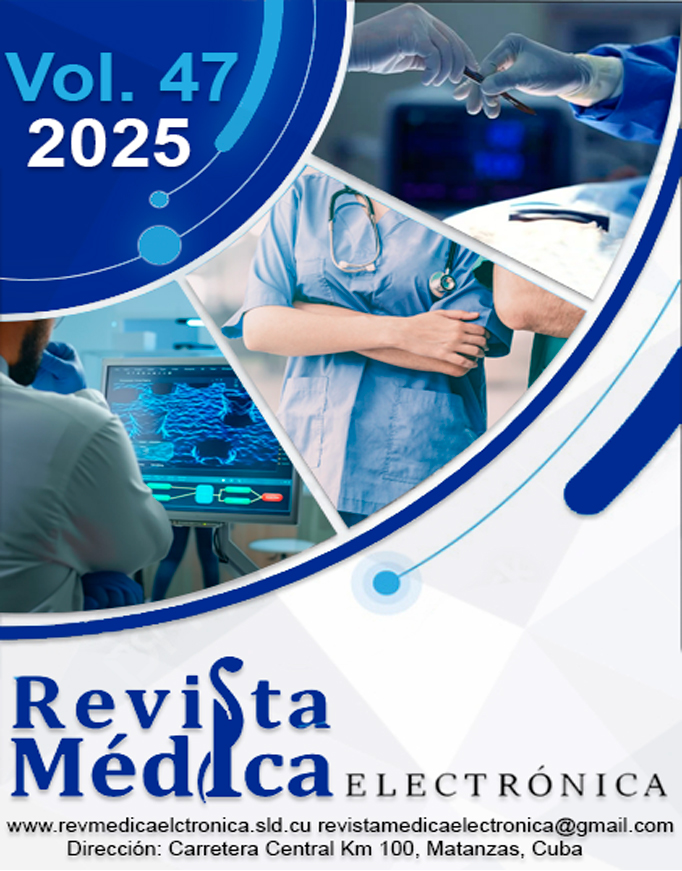Patrón de evaluación para la asignatura Ontogenia Humana y SOMA de la carrera de Medicina
Palabras clave:
proceso enseñanza-aprendizaje, habilidades, instrumento, evaluación, patrón de evaluaciónResumen
Introducción: La evaluación, como componente del proceso de enseñanza-aprendizaje, tiene como principal objetivo medir el alcance de las metas de aprendizaje que se presentan en el currículo. Infiere no solo evaluar el conocimiento de los estudiantes, sino el desarrollo de competencias y habilidades durante y al final del proceso de aprendizaje.
Objetivo: Describir el patrón de evaluación elaborado para elevar la calidad de la evaluación en la asignatura Ontogenia Humana y SOMA.
Métodos: Se realizó un estudio descriptivo con enfoque cualitativo, en la Universidad de Ciencias Médicas de Matanzas, durante el período de enero a mayo de 2023. Se utilizaron métodos teóricos, como análisis-síntesis, inductivo-deductivo, tránsito de lo abstracto a lo concreto y el enfoque en sistema. Entre los empíricos fueron empleados el análisis documental y el bibliográfico. El criterio de expertos se tuvo en cuenta para la validación del contenido del patrón propuesto. Como método estadístico se aplicó el coeficiente de variación para la validación del contenido del patrón de evaluación.
Resultados: El coeficiente de variación permitió evaluar la homogeneidad de criterios de los expertos, y se elaboró el patrón para la evaluación de los estudiantes en la asignatura.
Conclusiones: El patrón elaborado para la asignatura Ontogenia Humana y SOMA contribuye a la evaluación con equidad, lo que eleva la calidad del proceso docente educativo en la asignatura y en la carrera de Medicina de la Universidad de Ciencias Médicas de Matanzas.
Descargas
Citas
1. Carrillo Avalos BA, Sánchez Mendiola M, Leenen I. El concepto moderno de validez y su uso en educación médica. Investigación educ médica [Internet]. 2020 [citado 13/02/2024];9(33):98-106. Disponible en: https://www.scielo.org.mx/scielo.php?pid=S2007-50572020000100098&script=sci_abstract
2. García Riveros JM, Farfán Pimentel JF, Fuertes Meza LC, et al. Evaluación formativa: un reto para el docente en la educación a distancia. Delectus [Internet]. 2021 [citado 13/12/2023];4(2). Disponible en: https://www.inicc-peru.edu.pe/revista/index.php/delectus/article/view/130
3. Capote Castillo M, Lezcano Gil AM, Robaina Acosta I. Evaluación formativa y desarrolladora en universidades cubanas. Didasc@lia: didáct [Internet]. 2022 [citado 24/01/2024];13(4):1-25. Disponible en: https://dialnet.unirioja.es/servlet/articulo?codigo=8808742
4. Ministerio de Salud Pública. Plan de estudio E. Carrera Medicina. La Habana: Universidad de Ciencias Médicas de la Habana; 2019.
5. Beltrán Véliz JC, Tereucán Angulo JC, Salazar Ascencio JA, et al. Evaluación del aprendizaje en ciencias de la salud. Un proceso pedagógico innovador. Rev Fac Med [Internet]. 2021 [citado 13/02/2024];69(4):e89335. Disponible en: https://revistas.unal.edu.co/index.php/revfacmed/article/view/89335
6. Ministerio de Educación Superior. Reglamento organizativo del proceso docente y de dirección del trabajo docente y metodológico para las carreras universitarias. Resolución No. 47/22. La Habana: MES; 2022.
7. Rodríguez Acosta Y, Blanco Pereira ME, Pérez García A, et al. Dificultad y discriminación del examen de Ontogenia Humana y SOMA en la carrera de medicina. Educ Méd Super [Internet]. 2022 [citado 13/02/2024];36(2). Disponible en: https://ems.sld.cu/index.php/ems/article/view/2691
8. Salas Perea RS, Salas Mainegra A. Evaluación para el aprendizaje en ciencias de la salud. Edumecentro [Internet]. 2017 [citado 13/02/2024];9(1):208-27. Disponible en: http://scielo.sld.cu/scielo.php?script=sci_abstract&pid=S2077-28742017000100013
9. Sandoval Rubilar P, Maldonado-Fuentes AC, Tapia-Ladino M. Evaluación educativa de los aprendizajes: Conceptualizaciones básicas de un lenguaje profesional para su comprensión. Páginas de Educación. 2022;15(1):49-75. DOI: 10.22235/pe.v15i1.2638.
10. Ruvalcaba Romero NA, Gallegos Guajardo J, Orozco Solís MG, et al. Validez predictiva de las competencias socioemocionales sobre la resiliencia en adolescentes mexicanos. Diversitas [Internet]. 2019 [citado 13/11/2023];15(1):1-13. Disponible en: https://www.redalyc.org/journal/679/67958346008/html/
11. Espejo Guerrero J, Huarte Royo J, Moranta Ribas F. Validación de un cuestionario para medir conocimientos sobre medicamentos en adolescentes españoles. Farm Comunitarios [Internet]. 2022 [citado 25/01/2024];14(1):40-8. Disponible en: https://www.farmaceuticoscomunitarios.org/es/journal-article/06-validacion-cuestionario-medir-conocimientos-sobre-medicamentos-adolescentes
12. Gallardo Machado NdlM, Mederos Piñeiro M, Robaina Pedrosa T. Enfoque interprofesional de la evaluación en la formación del profesor de la Educación Infantil. Varela [Internet]. 2023 [citado 26/03/2024];23(65):116-23. Disponible en: https://revistavarela.uclv.edu.cu/index.php/rv/article/view/1542
13. Sánchez Peña H, Ipushima Ochavano D, Solís Trujillo BP. Aplicación de la evaluación formativa en estudiantes de educación superior. Horizontes. 2023;7(27):254-65. DOI: 10.33996/revistahorizontes.v7i27.511.
14. Deroncele Acosta A, Medina Zuta P, Gross Tur R. Gestión de potencialidades formativas en la persona: reflexión epistémica y pautas metodológicas. Univ soc [Internet]. 2020 [citado 26/03/2024];12(1):97-104. Disponible en: https://rus.ucf.edu.cu/index.php/rus/article/view/1417
Publicado
Cómo citar
Número
Sección
Licencia
Derechos de autor 2025 Revista Médica Electrónica

Esta obra está bajo una licencia internacional Creative Commons Atribución-NoComercial 4.0.
La misma permite:
• Copiar y redistribuir el material publicado en cualquier medio o formato.
• Adaptar el contenido.
Esto se realizará bajo los siguientes términos:
• Atribuir los créditos de los autores e indicar si se realizaron cambios, en cuyo caso debe ser de forma razonable.
• Uso no comercial.
• Reconocer la revista donde se publica.
Se mantienen los derechos de autoría de cada artículo, sin restricciones.






